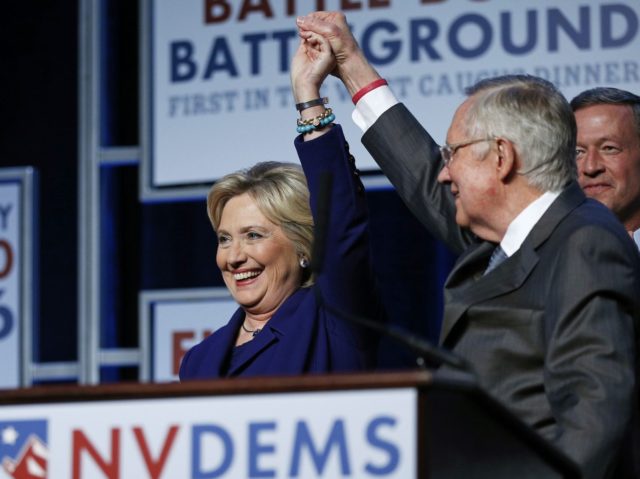The senior adviser for the top the Democrat in the Senate, in one of the thousands of emails hacked by Wikileaks, advocated for the establishment of a “project on progressive Islam” in the United States that would promote issues important to Muslim liberals in the nation.
Faiz Shakir, senior adviser for Senate Minority Leader Harry Reid (D-NV), wrote in a November 19, 2015 email to Democratic Presidential nominee Hillary Clinton’s campaign manager John Podesta:
Really appreciated the Saudi hit on feeding radical ideology. I wish we could have a project on building a progressive Islam. Would require advocating for and lifting up progressive leaders in that nation to speak about it/ to do online campaigning around it/etc. We tend to be overly focused on the violent strains of the radicalism. But even if there weren’t violence, the fact that too many who are for subjugation of women, against gays, against Jews and Christians, etc – is a serious problem for our future. Unfortunately, if you sounded progressive in the Middle East/Pakistan, you’d be putting yourself at security risk.
Shakir’s email was on of thousands linked to Podesta that have been recently released by Wikileaks. Sen. Reid’s adviser’s comments were in response to Podesta asking him what he thought about Clinton’s Nov. 19, 2015 speech on national security and the Islamic State (ISIS/ISIL).
Shakir’s reference to Saudi Arabia appears to be related to Clinton urging the Sunni powerhouse during her speech “to stop their citizens from directly funding extremist organizations, as well as the schools and mosques around the world that have set too many young people on a path to radicalization.”
Surprisingly, progressive Muslims do not appear to have too much faith in liberal politicians.
Liberal Muslim Feminist born in India Asra Nomani told the progressive journal Democracy:
I implore liberals in the West to join liberal Muslims in challenging the interpretations of Islam that belie progressive values, from punishment for consensual zina [sex out of marriage] to forcing women into the basements of mosques. In the Muslim Reform Movement, we stand for human rights. My hope is liberals will stand with us for humanity.
Other progressive Muslims argue that, despite America’s war on terror, the United States maintains a close relationship with many authoritarian states that empower those who are posing the most serious challenges to modernizing Islam.
Unlike their conservative counterparts, the progressive adherents of Islam support equal rights for women, gays, Jews, and Christians, as mentioned by Reid’s advisor Shakir.
Also surprisingly, some liberal Muslims reportedly say it is the politically progressive people they have come across who appear to favor maintaining the status-quo — conservative Muslims who fit the typical image of a Muslim and sound like one.
During the speech, the now Democratic Presidential nominee showed no qualms about calling the jihadi threat facing the United States and other parts of the world “radical jihadism,” a phrase that President Barack Obama and some members of his administration have been hesitant to use. Obama has refused to even say “radical Islam.”
Shakir praised Clinton for doing that, saying:
I think the ‘radical jihadism’ language works well. As you know, I wouldn’t have picked the fight over ‘radical islam’ to begin with. I’m always happy to just concede that it’s a real thing and define it as a marginalized strain, which she did do today [November 2015]…From a policy perspective, there’s a radical strain. Moreover, I like making the Muslim world feel like they need to activate to separate themselves and define themselves (which is happening).
The Democracy journal article features four liberal Muslim Americans sharing their thoughts about what they considered to be the progressive roots of Islam.
Among the liberal view points of Rep. Keith Ellison (D-MN), Muslim Feminist Nomani, Ani Zonneveld, founder and president of Muslims for Progressive Values, which reinterprets the texts of the Quran, and Hassan Abbas, who was born to a Sunni and a Shiite parents in Pakistan.
Nomani noted that the primary struggle progressive Muslims are facing is “to challenge interpretations of Islam that promote political Islam, sexism, and intolerance. I ask liberals to stand up with liberal Muslims for the values dear to their hearts, rather than being silent for fear of offending a minority group.”
Some progressive Muslim women refuse to wear a hijab, which despite protests against countries who force visitors and residents to do so by law, the liberal Muslim women in America feel like they are doing something wrong.
“As a progressive Muslim, I don’t wear a hijab, and I’ve seen several times where I’ve been interviewed by NPR and on public TV for example, at the end of the day my contribution to a particular story was cut out because I didn’t fit the typical image of what a Muslim is, or fit the sound of what a typical Muslim is,” said Zonneveld.

COMMENTS
Please let us know if you're having issues with commenting.